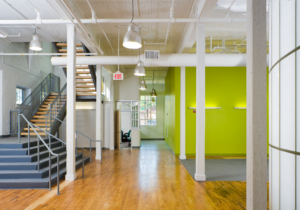by Debbie Koehler, Director of Marketing for DIGroup Architecture
View the entire newsletter for more articles: 2019 – NJAC County Biz – April

As NJ’s counties and municipalities determine how to leverage the federal Opportunity Zone program to jumpstart investment in the state’s underserved communities, it’s important to understand how aged or abandoned properties and structures can be reimagined to serve and inspire these communities.
Using design to build a community
Recognizing that diverse perspectives and first-hand input contribute to rich solutions, it is critical to engage local leaders, investors, and residents, regardless of participants’ ages or experience as an important first step to any project that impacts a neighborhood. An architect can facilitate a discovery process that explores design possibilities and transformative solutions for the community.
With this exercise, an architect builds credibility with stakeholders. Listening to those that are impacted most and collaborating on a solution that addresses both immediate and long-term needs, makes for better cities and towns.
The Community Charter School of Paterson was born from an adaptive reuse of a 34,000 sf former industrial building in Paterson’s Great Falls Historic District. The school’s founder, NJ Community Development Corporation, worked with DIGroupArchitecture and a committed group of community members, parents and staff to envision a “wildly inspired environment to propel a love of learning,” and a school that would serve as a core element in the local neighborhood. To honor the building’s history of service, much of the exterior envelope was retained and many original materials–concrete, steel, brick and wood–were integrated into the design.
In New Brunswick, City Officials and Catholic Charities sought DIGroupArchitecture to repurpose a historic firehouse. The structure, once an “an underutilized building that had a proud history of serving the community,” was transformed into the Unity Square Community Center. The first floor houses office space and a community kitchen. The Promise Culinary School, an outpost of the city’s soup kitchen, Elijah’s Promise, provides jobs for three staff members who teach day and evening cooking classes to promote health and wellness. The second floor is museum space dedicated to the history of firefighting and New Brunswick’s Fire Department.
With such leadership and guidance from a design firm like DIGroupArchitecture, New Jersey has the potential to be a national model on how to rebuild healthy, affordable, resilient communities.
DIGroupArchitecture, a minority-owned firm known for revitalizing communities statewide, is committed to good design that serves as a catalyst for positive change.
